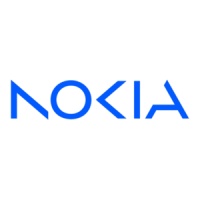Interface Configuration Guide 7705 SAR Interfaces
Edition: 01 3HE 11011 AAAC TQZZA 249
On the 16-port T1/E1 ASAP Adapter card, 32-port T1/E1 ASAP Adapter card, 2-port
OC3/STM1 Channelized Adapter card, 4-port DS3/E3 Adapter card, and T1/E1 ports
on the 4-port T1/E1 and RS-232 Combination module, DS0 channel groups and their
parameters are configured in the DS1 or E1 context. For a DS1 channel group, up to
24 timeslots can be assigned (numbered 1 to 24). For an E1 channel group, up to 31
timeslots can be assigned (numbered 2 to 32). For ATM, all timeslots are
auto-configured when a channel group gets created. The 4-port OC3/STM1 / 1-port
OC12/STM4 Adapter card supports channelization at the DS1/E1 level only.
On the 6-port E&M Adapter card, a single DS0 channel group and its parameters are
configured in the E&M context. On the 12-port Serial Data Interface card and RS-232
ports of the 4-port T1/E1 and RS-232 Combination module, DS0 channel groups and
their parameters are configured in the V.35, RS-232, or X.21 context. For RS-232, a
single timeslot is auto-configured when a channel group is created. For V.35 and
X.21, the number of timeslots auto-configured when a channel group is created
depends on the interface speed. For the 8-port Voice & Teleprotection card, a single
DS0 channel group and its parameters are configured in the codirectional, FXO or
FXS context and up to 12 timeslots can be assigned for the TPIF context.
Note:
• Encapsulation type is configured at the DS1 or E1 level on the following:
− 16-port T1/E1 ASAP Adapter card
− 32-port T1/E1 ASAP Adapter card
− 2-port OC3/STM1 Channelized Adapter card
− 4-port OC3/STM1 / 1-port OC12/STM4 Adapter card
− 4-port DS3/E3 Adapter card
− T1/E1 ports of the 4-port T1/E1 and RS-232 Combination module
• The encapsulation type is configured at the RS-232, V.35, or X.21 level for the
following:
− 12-port Serial Data Interface card
− RS-232 ports of the 4-port T1/E1 and RS-232 Combination module
• A port can support only one encapsulation type. When the first channel group is
configured for an encapsulation type, all other channel groups on the port are
automatically configured with that encapsulation type. To change an encapsulation
type, the channel group must be deleted, then recreated with the new encapsulation
type.

